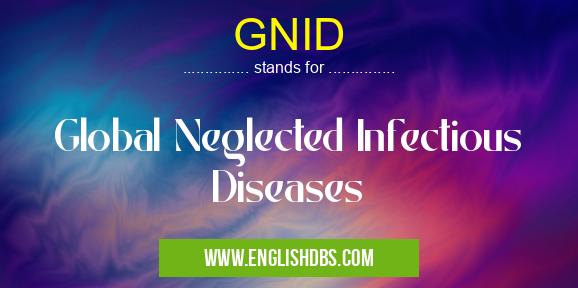What does GNID mean in DISEASES
Global Neglected Infectious Diseases (GNID) encompass a group of infectious diseases that primarily affect impoverished, marginalized populations in developing countries. These diseases often receive insufficient attention and funding, despite their significant impact on public health.

GNID meaning in Diseases in Medical
GNID mostly used in an acronym Diseases in Category Medical that means Global Neglected Infectious Diseases
Shorthand: GNID,
Full Form: Global Neglected Infectious Diseases
For more information of "Global Neglected Infectious Diseases", see the section below.
Meaning and Significance
GNIDs are characterized by:
- High Prevalence: They are widespread in specific geographic areas.
- Significant Morbidity and Mortality: They can cause severe illness, disability, or death.
- Poverty-Related: They disproportionately affect impoverished communities.
- Inadequate Resources: They receive limited research, funding, and public health interventions.
Examples of GNID
- Leishmaniasis: A parasitic disease transmitted by sandflies, causing skin ulcers, fever, and organ damage.
- Buruli Ulcer: A flesh-eating bacterial infection that affects the skin and underlying tissues.
- Chagas Disease: A parasitic infection transmitted by insects, causing heart failure and gastrointestinal problems.
- Onchocerciasis (River Blindness): A parasitic infection transmitted by blackflies, leading to blindness and skin damage.
- Dengue Fever: A viral infection spread by mosquitoes, causing severe flu-like symptoms and potential complications.
Challenges in Addressing GNID
- Limited Surveillance and Monitoring: Inadequate data on disease prevalence and distribution hinders efforts to target interventions.
- Weak Health Systems: Underfunded and overburdened health systems struggle to provide adequate diagnosis, treatment, and prevention for GNID.
- Stigma and Social Barriers: Discrimination and fear can prevent individuals from seeking medical care or adhering to treatment.
Global Efforts to Combat GNID
- World Health Organization (WHO): Develops guidelines, promotes research, and coordinates global efforts.
- Global Fund to Fight AIDS, Tuberculosis and Malaria: Provides funding for GNID programs.
- Non-Governmental Organizations (NGOs): Support community-based interventions, raise awareness, and advocate for increased funding.
Conclusion
GNIDs represent a significant public health challenge, particularly for marginalized populations. By understanding their significance, addressing challenges, and supporting global efforts, we can improve health outcomes and promote equity in access to healthcare.
Essential Questions and Answers on Global Neglected Infectious Diseases in "MEDICAL»DISEASES"
What are Global Neglected Infectious Diseases (GNIDs)?
GNIDs are a group of infectious diseases that disproportionately affect impoverished and marginalized communities in low- and middle-income countries. Despite their significant burden on public health, they receive limited attention and resources compared to other diseases.
What are the common characteristics of GNIDs?
GNIDs typically have the following characteristics:
- Predominantly affect poor and vulnerable populations
- Limited availability of diagnostics, treatments, and vaccines
- High prevalence in remote and underserved areas
- Often associated with poverty, malnutrition, and poor sanitation
What are the major GNIDs?
Some of the most prominent GNIDs include:
- Leishmaniasis
- Chagas disease
- Dengue fever
- Onchocerciasis (river blindness)
- Schistosomiasis
- Soil-transmitted helminthiases (worms)
Why are GNIDs often neglected?
GNIDs are often neglected due to:
- Lack of awareness and recognition
- Limited research and development efforts
- Inadequate funding for prevention and control programs
- Weak health systems in affected regions
What are the consequences of neglecting GNIDs?
Neglecting GNIDs can lead to severe health consequences, including:
- Chronic illness and disability
- Social stigma and discrimination
- Reduced productivity and economic growth
- Increased poverty and inequality
What can be done to address the neglect of GNIDs?
Addressing the neglect of GNIDs requires a multi-faceted approach that includes:
- Raising awareness and advocating for increased funding
- Investing in research and development
- Strengthening health systems in affected regions
- Implementing effective prevention and control programs
- Promoting equity and access to healthcare
